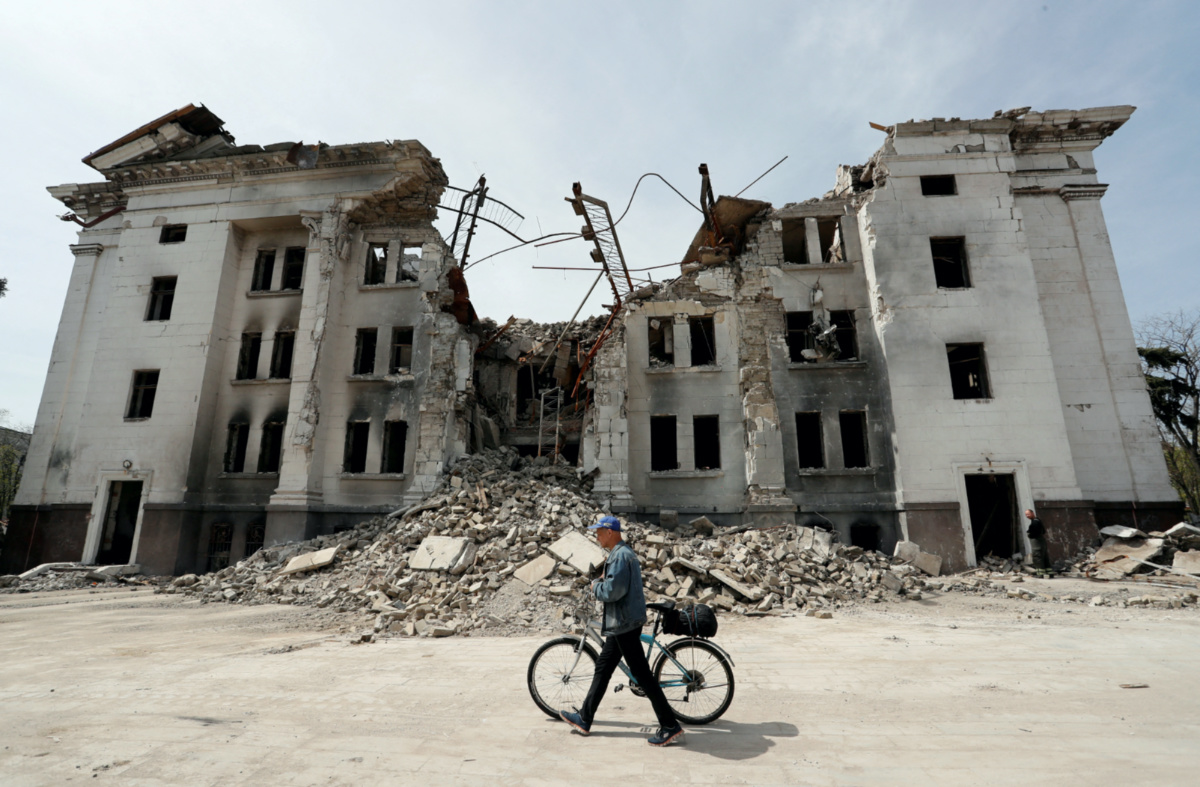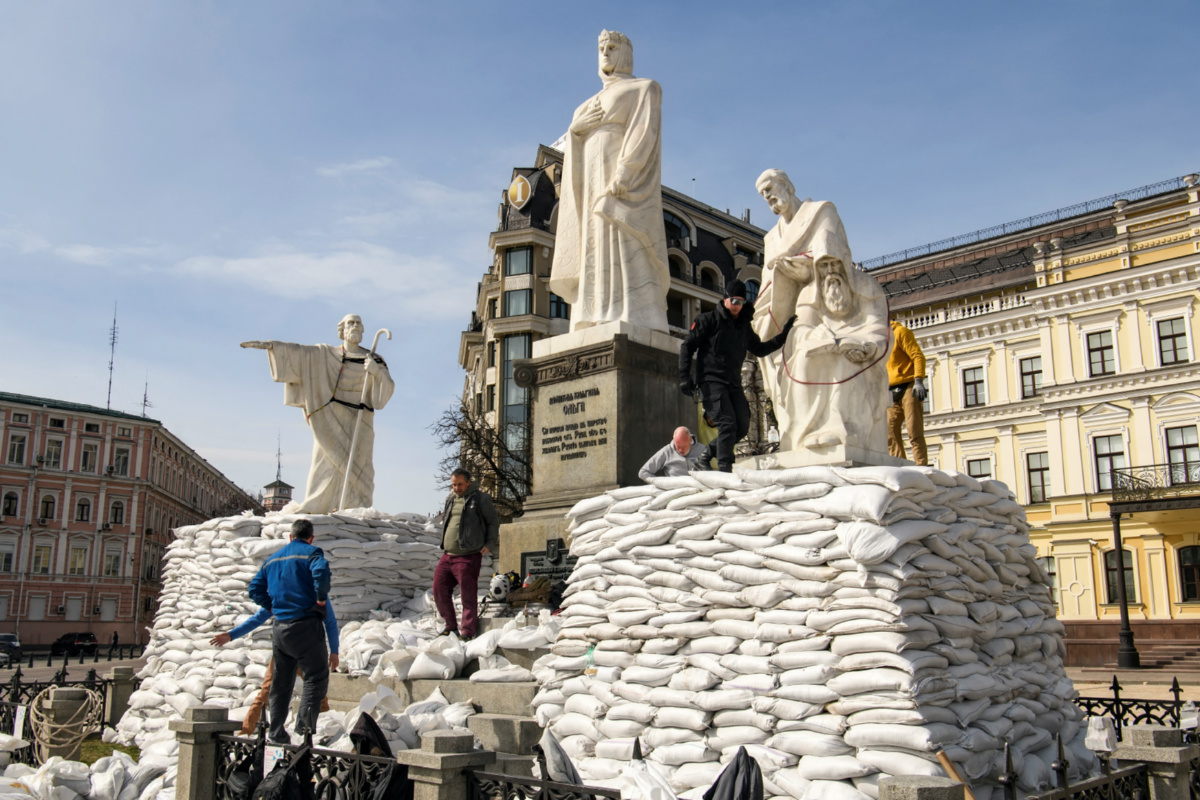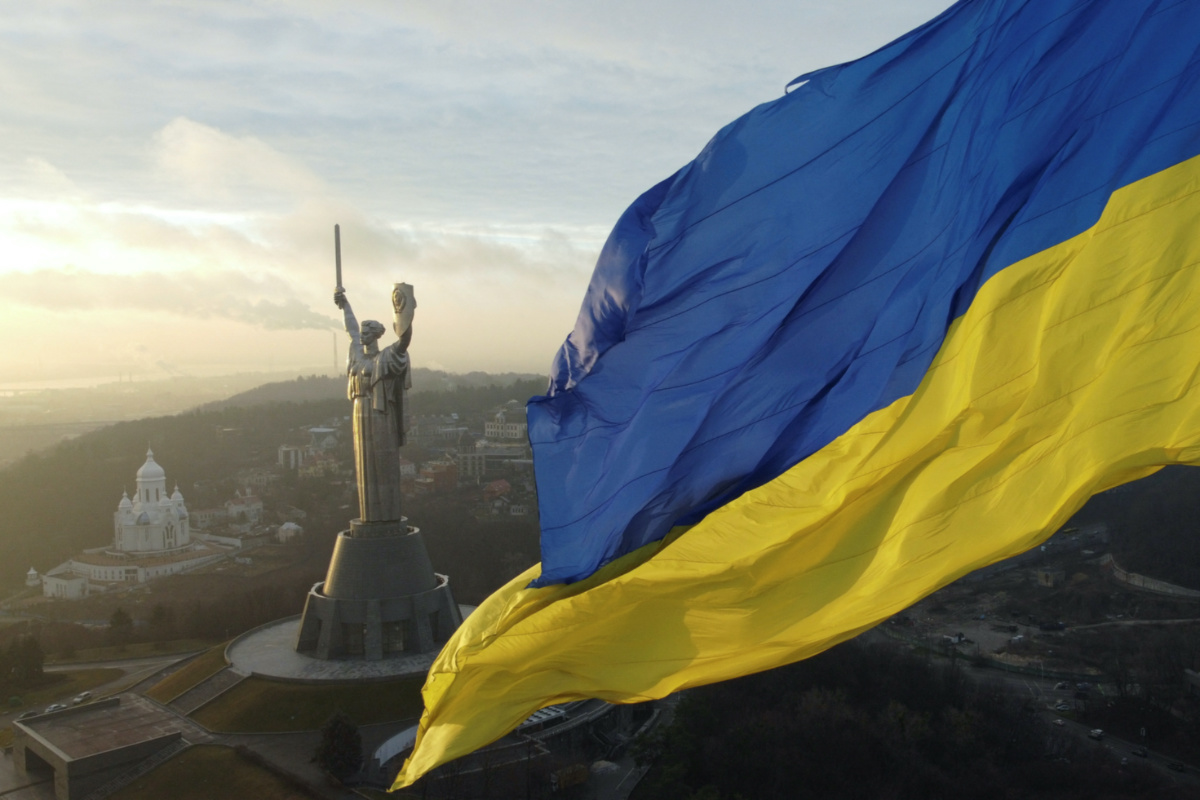
UMBERTO BACCHI, of Thomson Reuters Foundation, reports on efforts to preserve Ukraine’s cultural heritage in the midst of war…
Tbilisi, Georgia
As air raid sirens sounded over Kyiv in late February, some of the staff at Ukraine’s Ivan Honchar Museum decided to leave the relative safety of the bomb shelter and return to their desks to back up digital copies of its folk culture artefacts.
Days before Russia invaded, President Vladimir Putin had called Ukraine an artificial creation – words the ethnographic museum’s staff saw as a threat to the distinctive Ukrainian culture they have dedicated their careers to documenting.

A view shows a theatre building destroyed in the course of Ukraine-Russia conflict in the southern port city of Mariupol, Ukraine, on 25th April. PICTURE: Reuters/Alexander Ermochenko/File photo.
“We had a big responsibility to save this culture,” said Myroslava Vertiuk, deputy head at the museum, whose collection includes art, paintings, clothing and musical instruments.
The employees’ rescue mission involved uploading digital copies of the exhibits, as well as intangible assets such as recordings of local folk music to a cloud database.
“We wanted to make sure that if the collection was damaged or destroyed, we could rebuild it,” Vertiuk told the Thomson Reuters Foundation by phone.
“We wanted to make sure that if the collection was damaged or destroyed, we could rebuild it.”
Myroslava Vertiuk, deputy head at Ukraine’s Ivan Honchar Museum, talking about an initiative to upload digital copies of its exhibits.
Cloud storage was made available by the American Folklore Society – a non-profit organisation at Indiana University in the United States – as part of a wider grassroots effort to save Ukraine’s cultural heritage following the 24th February invasion.
As Russian bombs started dropping, AFS contacted researchers, ethnomusicologists, heritage scholars, folklorists, museums and private collectors who might have field recordings, interviews, photographs and material, and offered to help them.
“What we’re doing then is providing individual cloud storage links so that folks can back up their data,” said AFS’s executive director, Jessica Turner.
“We can store it, make sure that it is clean [of viruses] and safe…and have it ready for them when they need it again.”
Hundreds of historians, librarians and IT specialists from around the world have joined forces since the invasion began to form an online army to backup everything from websites to libraries, before buildings and servers are hit.
Saving Ukrainian Cultural Heritage Online (SUCHO), a project launched by three researchers from the United States and Europe who met on Twitter, has been archiving at-risk websites and digital content, with help from about 1,200 volunteers.
“We’re trying to capture publicly available websites before they go down,” said co-founder Quinn Dombrowski, an academic technology specialist at Stanford University in California.
“Once we’ve archived one of these websites, we basically have a copy of it that people can navigate and view as if it were live.”

Volunteers cover the monuments of Princess Olga, Apostle Andrew and Saints Cyril and Methodius with sand bags for protection, as Russia’s invasion of Ukraine continues, in Kyiv, Ukraine, on 28th March. PICTURE: Reuters/Vladyslav Musiienko/File photo.
About 15 per cent of the thousands of websites that volunteers have flagged as in need of back up are currently offline, although the number fluctuates, according to the group.
In some cases, this is due to servers, internet cables and powerlines being destroyed or damaged. In others, it is because bills have not been paid.
“Ukrainians have a lot of priorities right now other than paying for their website servers,” said Dombrowski.
The Ukrainian Research Institute at Harvard University has also been offering cloud storage to academics in need, and has created a digital library of the invasion.
The latter is made with an online tool that repeatedly captures a select number of web pages, such as news websites and politicians’ social media, at different time intervals.
This provides researchers with a time machine of sorts that allows them to go back and see what was being reported or said online throughout the war.
“Our role is an extension of the librarian role in general: to collect, to preserve and give access to information,” said the project’s lead Olha Aleksic, a Harvard bibliographer.
“Whether we’re talking about the books, the printed materials, or digital data, the primary goal remains the same.”
We rely on our readers to fund Sight's work - become a financial supporter today!
For more information, head to our Subscriber's page.
Poland’s Pilecki Institute has been recording witness testimonies, mainly from refugees, to collect and preserve evidence of war crimes, including against cultural heritage such as the destruction of museums and archaeological sites.
The success of such initiatives has been mixed in the turmoil of war.
Sebastian Majstorovic, a co-founder of SUCHO, said they captured the website of the state archive of the embattled city of Kharkiv, including scans of census records and court files, just hours before it went down.
Yet the list of websites they did not reach in time is painfully long, he added.
Iryna Voloshyna, a researcher at Indiana University, lamented the fate of the small museum of Ivankiv, near Kyiv, which housed works of renowned folk artist Maria Primachenko, and went up in flames even before AFS found out about it.
Back up efforts are ongoing almost two months after the war started.
SUCHO has a team following developments on the ground to draw up a priority list of websites that need archiving first.
AFS is receiving data from researchers who were only recently able to return to their homes as Russian troops shifted their focus to the east – as well as others who sought shelter in rural areas with poor connectivity, said Voloshyna.
“We’re often talking about terabytes of data, including videos and years of work. Even if the connection were stable, sometimes it takes a week to finish an upload,” she said.

Ukraine’s biggest national flag on the country’s highest flagpole and the giant ‘Motherland’ monument are seen at a compound of the World War II museum in Kyiv, Ukraine, on 16th December, 2021. Picture taken with a drone. PICTURE: Reuters/Valentyn Ogirenko/File photo.
There are other challenges: Turner of AFS said the material they receive is often littered with malware, which takes time to clear.
The group is also asking researchers unpleasant but necessary questions about what to do with their work, such as photos and videos, if they do not survive the war, she said as the initial agreement was only to provide short-term storage.
Meanwhile, SUCHO is crowdfunding to ship equipment such as scanners and cameras to institutions lacking a digital version of their collections to back them up.
It said these digital records could be used to document potential war crimes, for example, if catalogued items were looted or destroyed.
SUCHO also hopes to use collected data for an online exhibition of Ukrainian works – an initiative that Vertiuk of the Ivan Honchar Museum said was urgently needed.
“A big part of this war is about information, history and culture,” Vertiuk said.
“Ukrainian culture is often shown abroad as part of a broader Russian culture. Now it’s time to make our unique Ukrainian voice heard loud and clear.”





